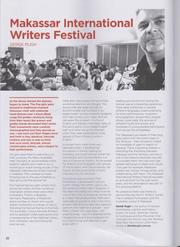
Commentary on commentators.
Derek Pugh
It seems journalists can be an obedient lot, and writers on the market must be some of the more acquiescent to their editor’s commands. I write this as a layman and occasional penman, who doesn’t even know any journos, nor ever really talked to one, but the evidence points to an editorial rule that prohibits writers from using the same word twice when describing a day’s market action. I imagine writers clutching their thesauruses to their bosom, printouts bursting from their pockets, hurrying to their desks to complete the required 15 cm of column. Which words to use? Perhaps they have lists pinned to the wall, or weekly tick box rosters for word use. I’ve done some collecting:
Stock market up? Well, there’s a plethora of jolly little words to be employed for this glorious day. A 1% gain one week to one commentator was a ‘surge’, to another a ‘recovery’ and a third a ‘rally’ on the same day. In this surge/recovery/rally the following words were used to describe the movements of the stocks in one newspaper alone: climbed, rose, up, surged, rebounded, recovered, soaring, showed continued strength, eked out a gain, turned the tide, gained ground, added, posting a gain, gained, support prices, rallied, steadied,
Stock market down? Recent years might have seen these words worn out, but there they still glimmer upon the page from the same reporter a few days later. Our erudite wordsmith dusted off words he’d put aside during the surge and he used the following: fell, fell sharply, sharp drop, eroded demand, shed, lowered, dipped, pressure, hard landing, profit taking, lost, cutting, gains wiped out, weaker, trimmed, gave up ground, in the red, closed in negative territory, plunged, tumbled, and, ‘the game can go on, but it’s not for the faint hearted’. He even wrote “market jitters”, which of course always means down, as does “investor nervousness” and “spooked investors” which he’s used on other occasions.
This reporter is not the only one. They’re all at it. Rule Number 1: No word repetition. For examples:
BHP Billiton fell $1.21 while Rio Tinto plunged $3.96. Woodside Petroleum was off 24c, and Santos down 25c, Caltex Australia shed $1.31. NAB declined 73c, ANZ sagged 32c, Westpac dipped 32c, while Commonwealth Bank added 12c. Newmont eased 9c, Newcrest cut $1.22, and Lihir retreated 25c. Only last week it was: ANZ backpedalled (sic) 20 cents to $21.30, Westpac ended down 21 cents at $23.56 and Commonwealth Bank dipped one cent to $52.50.
Do I sound like I am complaining? Far from it. To be fair, and this may surprise some readers, economic reports are sometimes necessarily dull and, to humble amateurs such as myself, perusing the language choice of the day adds interest to reading the papers or on line reports. The imagery of ANZ sagging whilst Rio took the plunge is cheery, despite it’s meaning to the suffering share holders. So to the canny journalists and editors who demand this smorgasbord of tautology each day I doff my literary cap to you. Keep it up, high, elevated, gainful, raised, soaring and/or surging….
Derek Pugh
It seems journalists can be an obedient lot, and writers on the market must be some of the more acquiescent to their editor’s commands. I write this as a layman and occasional penman, who doesn’t even know any journos, nor ever really talked to one, but the evidence points to an editorial rule that prohibits writers from using the same word twice when describing a day’s market action. I imagine writers clutching their thesauruses to their bosom, printouts bursting from their pockets, hurrying to their desks to complete the required 15 cm of column. Which words to use? Perhaps they have lists pinned to the wall, or weekly tick box rosters for word use. I’ve done some collecting:
Stock market up? Well, there’s a plethora of jolly little words to be employed for this glorious day. A 1% gain one week to one commentator was a ‘surge’, to another a ‘recovery’ and a third a ‘rally’ on the same day. In this surge/recovery/rally the following words were used to describe the movements of the stocks in one newspaper alone: climbed, rose, up, surged, rebounded, recovered, soaring, showed continued strength, eked out a gain, turned the tide, gained ground, added, posting a gain, gained, support prices, rallied, steadied,
Stock market down? Recent years might have seen these words worn out, but there they still glimmer upon the page from the same reporter a few days later. Our erudite wordsmith dusted off words he’d put aside during the surge and he used the following: fell, fell sharply, sharp drop, eroded demand, shed, lowered, dipped, pressure, hard landing, profit taking, lost, cutting, gains wiped out, weaker, trimmed, gave up ground, in the red, closed in negative territory, plunged, tumbled, and, ‘the game can go on, but it’s not for the faint hearted’. He even wrote “market jitters”, which of course always means down, as does “investor nervousness” and “spooked investors” which he’s used on other occasions.
This reporter is not the only one. They’re all at it. Rule Number 1: No word repetition. For examples:
BHP Billiton fell $1.21 while Rio Tinto plunged $3.96. Woodside Petroleum was off 24c, and Santos down 25c, Caltex Australia shed $1.31. NAB declined 73c, ANZ sagged 32c, Westpac dipped 32c, while Commonwealth Bank added 12c. Newmont eased 9c, Newcrest cut $1.22, and Lihir retreated 25c. Only last week it was: ANZ backpedalled (sic) 20 cents to $21.30, Westpac ended down 21 cents at $23.56 and Commonwealth Bank dipped one cent to $52.50.
Do I sound like I am complaining? Far from it. To be fair, and this may surprise some readers, economic reports are sometimes necessarily dull and, to humble amateurs such as myself, perusing the language choice of the day adds interest to reading the papers or on line reports. The imagery of ANZ sagging whilst Rio took the plunge is cheery, despite it’s meaning to the suffering share holders. So to the canny journalists and editors who demand this smorgasbord of tautology each day I doff my literary cap to you. Keep it up, high, elevated, gainful, raised, soaring and/or surging….

 RSS Feed
RSS Feed